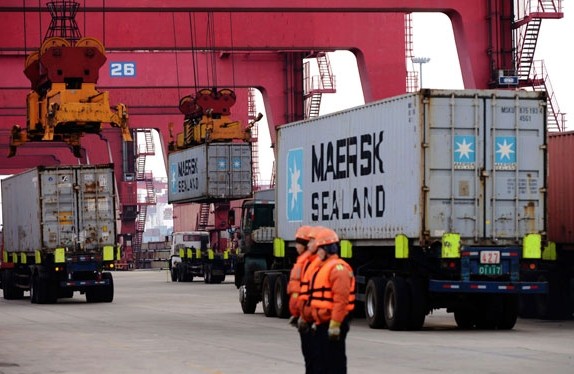

Workers move containers at a port in Qingdao, the capital of Shandong province. China's total foreign trade in January unexpectedly surged 10.3 percent year-on-year, with exports up 10.6 percent and imports up 10 percent. Provided to China Daily
China's export performance is likely to fluctuate in the first quarter, but full-year trade growth will be similar to last year, Shen Danyang, spokesman of the Ministry of Commerce, told a news conference on Monday in Beijing.
"Because of seasonal factors, including the Lunar New Year festival, China's exports in the first quarter of this year will probably see some fluctuations, and we can't rule out the possibility that February trade figures will show an abnormal change from last year.
"As for the full-year outlook, we maintain a cautiously optimistic view on the whole. We have confidence in securing a trade growth pace equal to last year, while further improving the trade growth pattern and structure," Shen said.
China's total trade rose 7.6 percent year-on-year in 2013, missing the government's target of 8 percent.
Total foreign trade in January unexpectedly surged 10.3 percent year-on-year, with exports up 10.6 percent and imports up 10 percent.
"However, we should be clear that the export surge doesn't necessarily indicate favorable times for Chinese exporters. A recent survey showed that many exporters, especially small and medium-sized enterprises, are generally having a hard time because of narrowing profits," Shen said.
He said profits are being affected by higher costs, renminbi appreciation and difficulties in raising export prices.
The export surge in January was mainly driven by economic recovery in developed countries, which increased demand for Chinese products, as well as the government's trade-support measures introduced in the second half of last year, according to Shen.
He denied that the export figure was inflated by capital inflows disguised as trade payments.
Exports to the European Union, China's largest trade partner, rose 18.8 percent in January. Shipments to the United States increased 10.7 percent.
Exports to Japan went up 16.1 percent, despite strained bilateral ties.
"The January figures for trade with Japan, as well as China's investment in Japan, shouldn't be over-analyzed," Shen said.
"Trade figures in the first two months are usually distorted by seasonal factors like the (Lunar New Year) festival. The capital delivery connected with some big investment projects can also change the monthly outward investment figures markedly," Shen said.
"Japanese investment in China strongly supported bilateral trade figures. But the number and value of Japanese investment projects in China declined last year and also in January.
"Given this, the bilateral trade outlook is not optimistic," Shen added.
In 2013, China's overall ODI in Japan dropped 23.5 percent, and Japan's investment in China decreased 4.28 percent, according to the ministry.
Liu Xuezhi, a researcher at the Bank of Communications Ltd in Shanghai, said in a note that the weeklong Lunar New Year festival, which began on Jan 31 this year - about two weeks earlier than last year - prompted exporters to front-load business ahead of the holiday. That increased the January export data.
February exports will show steady growth because the US and EU economies maintained recovery momentum and that sustained robust demand for Chinese exports, the note said.
Import growth in February will slow, Liu said, because stockpiles of energy products and raw materials stood at high levels following massive imports in January. Meanwhile, manufacturing activity remained sluggish.
Concern about heavy smog across the country has also curtailed use of petrochemical and energy products in the world's second-largest economy.
He Keng, former vice-chairman of the Financial and Economic Committee of the National People's Congress, said on Friday that China's foreign trade this year will be bigger than last year because of a "satisfactory" recovery in developed economies and slower appreciation of the yuan.
Copyright ©1999-2018
Chinanews.com. All rights reserved.
Reproduction in whole or in part without permission is prohibited.